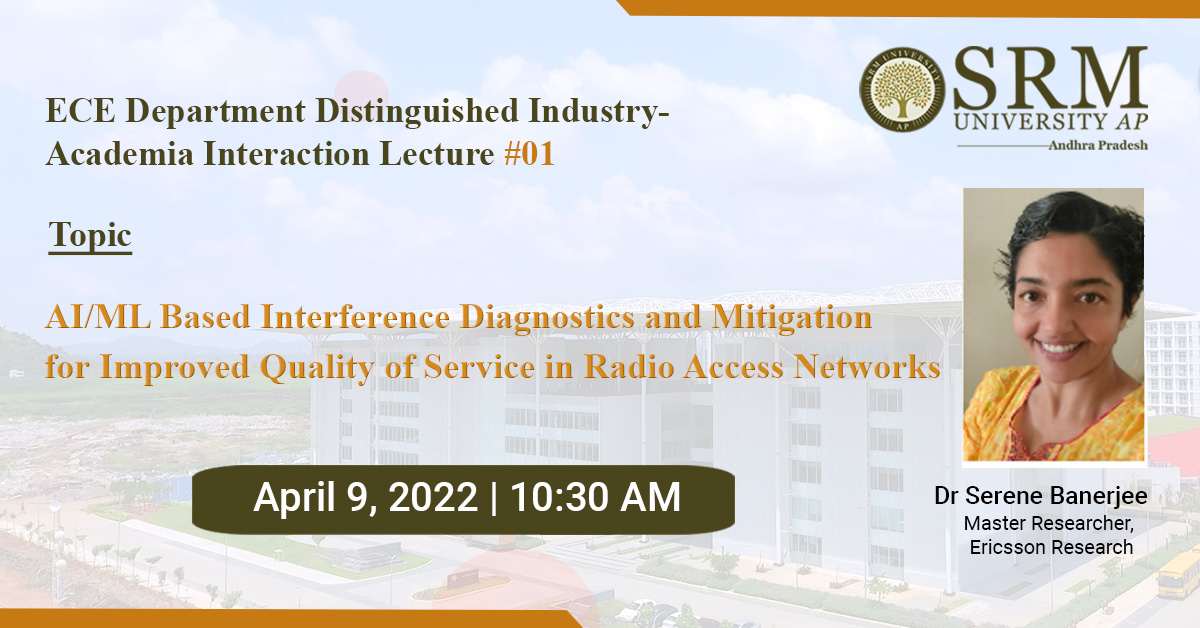- This event has passed.
AI/ML algorithms for radio access networks
April 9, 2022 @ 10:30 am - 12:30 pm
The Department of Electronics and Communication Engineering is hosting the first instalment of the Distinguished Industry-Academia Interaction Lecture in the ECE DDIAL series. The event is scheduled on April 9, 2022, at 10.30 am. Dr. Serene Banerjee, Master Researcher, Ericsson Research, will be the keynote speaker. She will deliver a talk on the topic ‘AI/ML Based Interference Diagnostics and Mitigation for Improved Quality of Service in Radio Access Networks’.
Abstract of the Talk
For coverage and capacity optimization, Uplink Power Control is one of the key steps, in addition to antenna tilting and Downlink Power Control. For self-organizing networks, automated algorithms for Uplink Power Control are a necessity. However, Uplink Power Control affects the noise in the neighbouring cells. It is important to detect this interference to monitor uplink noise. Uplink noise due to power control manifests as static interference in the channel. The current state-of-the-art baseline model is based on regression models. We have proposed automated detection of static interference in the uplink channel of cells based on machine learning models. We have evaluated the same on customer data on LTE networks with high accuracy. The detected cells are subsequently used to correct the nominal power parameter through a proposed teacher-student model based on the primary cell and its neighbours. This approach shows better performance than the state-of-the-art baseline methods. The dual of static is dynamic interferences and can be attributed to traffic load, Passive Intermodulation (PIM) and thermal noise, etc. PIM identification is a major component in troubleshooting modern wireless communication systems. The introduction of carrier aggregation has increased PIM occurrences. Current state-of-the-art approaches include manual rule-based and hardware-based debugging. These approaches can detect the occurrence of PIM, long after the event occurrence and result in incurring incidental costs. We propose an ensemble of time series-based machine learning and signal processing approaches that can automatically identify PIM in real-time by analyzing Key Performance Indicators (KPI) of the primary cell and its nearest neighbours. We validate our results for various environmental conditions in data available from LTE and 5G consumer networks. We have further extended the work to multi-frequency time series to handle finer time granularities and detect PIM anomalies in an online learning setting. We further propose a self-supervised reinforcement learning approach to predict PIM related anomalies before it happens. We forecast environmental conditions that give rise to PIM based on offline historical data and model to predict future occurrences. Experimental results are on real-world datasets comprising 50,000+ cells which have shown to accurately predict PIM 60% of the time. To the best of our knowledge, this is the first work, where we are able to predict PIM anomalies before they happen. Post PIM-identification, we propose a binary search-based solution that is amenable to real-time implementation. We show through simulations that this search in tandem with a reinforcement learning-based solution can dynamically mitigate and cancel PIM. Results show that the number of steps to converge, to identify and mitigate the PIM in uplink frequency is reduced by a large factor. To summarize, our contributions include using machine learning algorithms for: (1) robust interference classification, (2) demonstrating p0-nominal recommender as teacher-student model, (3) a times-series analysis-based PIM identification, (4) extending the approach to multi-frequency time series, and for online learning, (5) demonstrating a self-supervised reinforcement learning approach to predict PIM anomalies before they happen, and (6) mitigating PIM, in spite of environmental unknowns, by employing binary search in conjunction with ML/RL-based approaches.
About the Speaker
Serene Banerjee, Master Researcher, Ericsson Research, has 17+ years of industrial experience after completing her PhD from the University of Texas at Austin, under Prof Brian L Evans in 2004. She has completed BTech(H) in Electronics and Electrical Communications Engineering from IIT Kharagpur in 1999. At Ericsson, she is focusing on developing AI/ML algorithms for Radio Access Networks. Prior to Ericsson, she has worked with Texas Instruments, HP, and Johnson Controls. She has 23 peer-reviewed publications, 9 granted patents, and several pending.
Join the webinar for an informative interaction with Dr Serene Banerjee.


